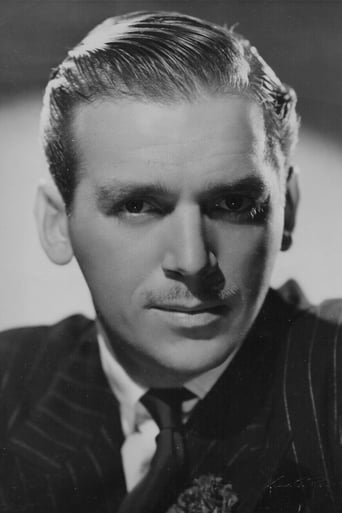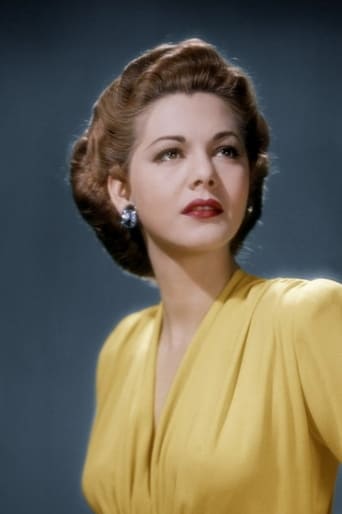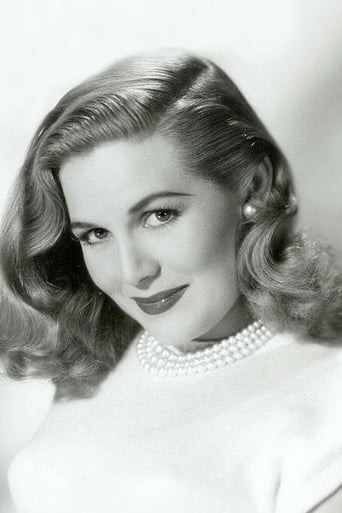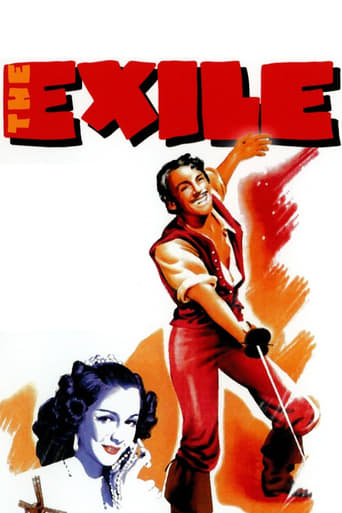
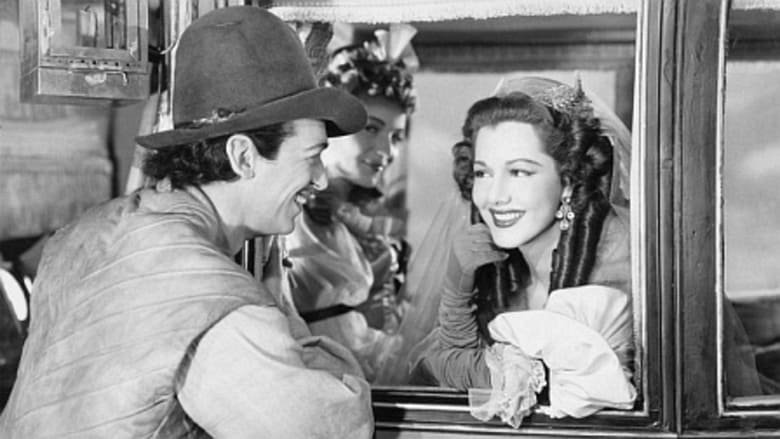
The Exile (1947)
In 17th-century England, Charles II, the rightful heir to the kingdom, is driven from his country by militants working for rogue leader Oliver Cromwell. Charles ends up in the Netherlands, where he falls for local beauty Katie and spends his days happily in the quiet countryside. Unfortunately, Cromwell's associate Col. Ingram and his men track Charles down, and the would-be monarch must resort to swashbuckling his way to freedom.
Watch Trailer
Cast
Reviews
Let's be realistic.
Bad Acting and worse Bad Screenplay
Easily the biggest piece of Right wing non sense propaganda I ever saw.
Strong acting helps the film overcome an uncertain premise and create characters that hold our attention absolutely.
Max Ophüls is one of the greatest directors of all times, he started as assistant director to Anatole Litvak and learned very much from him, which you can see and feel in his films: they had a unique great efficiency of direction in common, but Ophüls added to his supreme mastery also a knack for moving cameras. You see that almost hallucinatory camera-work in every one of his films. His Jewish origin (his real name was Maximilian Oppenheimer) gave him problems with the German Nazi regime although he was an established leading director, so he changed his name and went to France - Ophüls is an old German aristocratic name, which he felt suited his image. He made no films between 1940 and 1947, being practically exiled but working in France and Italy and even America but returned to the screen in 1947 to make this flashing virtuoso film of exuberant romantic intrigue - the exiled king of England in constant fear of his life by the wicked roundheads escapes to a farm in Holland where he cultivates tulips with a charming country girl, with whom he naturally falls in love. Another exiled Englishman, an errant actor out of work, exuberantly played by Robert Coote, poses to be the exiled king to be treated thereafter but is visited by a French countess who knew the real king, which complicates matters, which are further complicated as the farm is invaded by roundheads who come to root out the king dead or alive. The film is actually written and produced by Douglas Fairbanks Jr, so it's really very much his film, and he makes the best of it in superb classical Fairbanks style with dashing duels and much kissing in between - especially impressive is the great hullabaloo with all the roundheads falling over each other in the desperate chase for the king in the windmill. There are great windmill acrobatics here. In brief, the film is a feast to the eyes, the story is mounting in intensity and interest all the way, the music is perfectly suited to illustrate the moods, the idylls, the drama, the tension and the high romance, it's in most ways the perfect adventure film where nothing is missing, and Max Ophüls' supreme direction and marvellous use of details crowds the film with opulent excellence from beginning to end. In brief, after seven years' absence Ophüls was back on the screen, and his next film would be the masterpiece "Letter from an Unknown Woman".
It was the second time Ophüls had broached an historical subject .In France 1939, he filmed the tragic love story of Franz Ferdinand and Countess Sophie Chotek ,of course a misalliance,hence a Morganatic marriage.As it did not happen as Charles Stuart was concerned ,the lovers are left with memories ("I'll visit you in your dreams").If it weren't for the last minutes ,the film would not be a real Max Ophüls (spelled "Opuls") movie.The last third is a bit Curtizesque ,Douglas Faibanks Jr recalling Erroll Flynn.This is certainly a good film ,but it cannot be included in the director's best works such as "Liebelei" "La Signora Di Tutti" "Letters from an unknown woman" or "Madame De" .This is fictionalized history -whereas "De Mayerling A Sarajevo" depicted real events- where the round heads (the Puritans) ,dressed in black nicely play the parts of the villains against a noble hero dressed in white .There are good lines ;I particularly like this one "If I ever come home,I shall belong to no party" .Another good moment: "He lives in luxury and idleness" say the Puritans (a picture shows the "farm worker" plowing;"He must be ready to kill" (the man and his girl see the new-born chicks ) Maria Montez is the "star" of the film but her appearance does not exceed ten/fifteen minutes .It's Holland as we imagine it: windmills (with an impressive duel ),tulips ,canals,fair-haired girls ...
When Douglas Fairbanks, Jr. started his career in silent screen he did not go for the swashbuckling roles that his famous father did. My guess is he wanted to be judged on his own as a player. In fact it was his mother who when Fairbanks, Sr. was slow with the child support who got him into film in the first place, hoping to capitalize on the name. Later as he got older and was established in his own right, Fairbanks made claim to the legacy of his father in such films as The Exile.In fact Fairbanks both wrote the screenplay and produced this film and got European director Max Ophuls for the piloting. He plays a most famous exile, Charles Stuart, Charles II of Great Britain who is exiled in the Netherlands and poised to reclaim his own in 1660.The story is based on a historical novel by British writer Cosmo Hamilton and it tells of that brief interregnum in British history between the sudden death of Oliver Cromwell and the restoration of Charles II. Charles Stuart had narrowly escaped from his country after the Puritan takeover and was living in exile in somewhat humble circumstances wherever in Europe he could find shelter. In 1660 it was the Netherlands.Historians have debated long about the collapse of the military dictatorship of Lord Protector Oliver Cromwell. He had things pretty much his own way and when he died his son Richard wasn't up to the job he inherited. It was a close run thing that the United Kingdom did not break apart into civil war again at this time.By 1660 just about everybody except the most committed of Puritans felt that only a Stuart Restoration would keep the country united. But some of those most committed Puritans had a big vested interest in seeing that the Restoration did not occur. Therein lies the tale of this film.Douglas Fairbanks, Jr. is a perfect Charles Stuart, in fact he looks quite a bit like him. As in real life sharing his exile is Lord Clarendon who is played here by Nigel Bruce. When Charles reclaimed his throne, Lord Clarendon became his first minister. In the film as in life Clarendon was constantly reminding him of his duty and not to spend all his time on frivolity and chasing skirts. In real life after the action of this film, Charles got rid of Clarendon, but with a decent pension for loyalty and services rendered.As petitions come from various folks over in Great Britain to resume the monarchy, Charles plays coy all the time dodging Puritan agents. Several have come to the town where he's staying and Charles has a bit of sport with them by just pretending he's a penniless exile. He even takes a job as a laborer on Paula Corday's farm. He even falls for her as he did with MANY women.But a most cunning and ruthless Puritan in the person of Henry Daniell arrives to take over the hunt and kill the king before he can set sail back to his realm. This is one of Daniell's finest performances on screen, you can believe he's one cold and merciless killer and a true believer in the Puritan Revolution. Fairbanks and Daniell have a duel in a Dutch mill that's the equal of the one Errol Flynn and Basil Rathbone had in Robin Hood.As per her contract Maria Montez got top billing as a French countess who finds Charles Stuart as a farm hand and delivers a message of support from his cousin Louis XIV of France. Robert Coote has a very funny part as an unemployed actor who is passing himself off as Charles Stuart and who the Puritans nearly kill for such a good performance. Fairbanks uses Coote to his own end to further his deception, but steps in when Daniell's about to run him through.The Exile is one of Douglas Fairbanks, Jr.'s finest films and he really does the part in a way that would have made Dad proud.
I remember seeing the preview of THE EXILE when I was 9 years old, but never actually saw the film till last night. Reminded of this rare and all-but-forgotten picture via this website, I sought it out on the internet and purchased it for a modest price. No disappointment. A romantic adventure film set in 1660 combines real history with highly entertaining story. Douglas Fairbanks Jr. was a great leading man and he plays this role with ease and vigor. The re-creation of the era was perfect and the film has not a trace of today's annoying Attention Deficit Disorder editing. They didn't make any good movies in 2005, as evidenced by the trashy 5 lefty-spin pictures nominated as Best Picture. If you want to see a classic, don't give up on it. Seek it out and with tenacity you can find it and see it. I've only failed once, but still looking for that rarity.
